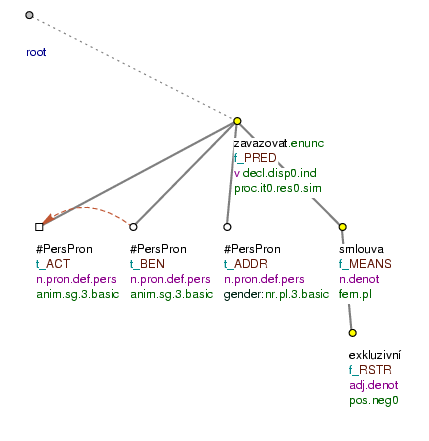MEANS modifications refer to:
-
a tool, instrument.
Examples:
Napsal to na počítači.
MEANS(=He wrote it on the computer)Na šest metrů dlouhém žebříku.
MEANSvlezl do zámku nezajištěným oknem. (=He broke into the castle using a six meters long ladder)Není zjistitelný detekčními přístroji.
MEANS(=It can't be detected by detectors)Firma provádí pod silnicí průraz pomocí vody.
MEANS(=The company is doing the penetration with water) -
the mediator.
Examples:
Od 25. září budou přepravovány těžké kamiony na trase Drážďany - Lovosice po železnici.
MEANS(=...the trucks are going to be transported by rail)Nájemce může podle svých požadavků dostat nabídku i po telefonu.
MEANS(=... get the offer by phone)Pošli to po Janě.
MEANS(=Send it by Jana)Ti, kteří si výpisy nevyzvedli osobně, je obdrží prostřednictvím pošty.
MEANS(=...will get it by mail) -
a transport means.
Examples:
Marcela Sadilová jede na kajaku.
MEANS(=MS is paddling in a kayak)Ten na pražské letiště přicestoval letadlem.
MEANS(=He came by plane)
MEANS modifications modify verbs and their derivatives (e.g.: uhradit dluh směnkou.MEANS (=to pay a debt with a bill), instituce zmocněná zákonem.MEANS (=an institution authorized by the law), měření pomocí parity.MEANS (=measuring with the help of parity)).
Forms. The basic forms of the MEANS modification are:
-
noun in a non-prepositional case.
The most common forms:
instrumental Výstražnými výstřely do vzduchu zahnala včera ruská pobřežní hlídka japonské rybářské lodě. (=The Russian coastguard chased away the Japanese trawlers by shooting warning shots) -
prepositional phrase.
The most common forms:
cestou+2 vytvoření pracovních příležitostí cestou zvýšeného vývozu (=creating job opportunities by increasing the export) do+2 Měli bychom tuto knihu vzít do ruky a těšit se z ní. (=We should take the book in our hands and enjoy it) na+4 Laso chtěl na fakturu nakoupit elektroniku. (=Laso wanted to buy electronics without paying cash; lit. on invoice) na+6 Zloděj na bicyklu odjel. (=The thief left on the bicycle) o+4 Někdo mlátil jeho hlavou o schody. (=Somebody smashed his head against the stairs); Lidé si neradi sami pinkají o zeď. (=People are not interested in playing against the wall) o+6 Chodil o berlích. (=He walks on crutches) po+6 Po provaze se spustil do dolní části kostela. (=He got down on a rope) pomocí+2 Je jim nabídnuta pomocí německých sociálních pracovníků forma alternativní výchovy. (=... with the help of German social workers) prostřednictvím+2 Drobný investor může prodat své akcie prostřednictvím makléřské firmy na burze. (=... sell the shares through a broking house) přes+2 Izraelská firma buduje systém bezporuchového spojení přes satelit. (=...connection by satellite) s+7 Kdysi jsem hrál s hliníkovou raketou. (=I used to play with an aluminium racket once) s pomocí+2 Slabozrací většinou fungují normálně s pomocí silných brýlí. (=...with the help of strong glasses) skrz+4 Čeho lze skrze OSN dosáhnout? (=What can be reached through UNO?) v+6 Milionové částky přinesou sebou v kufříku. (=They'll bring the money in a briefcase); výdělek v dolarech (=salary in dollars) z+2 Mzdy učitelů jsou hrazeny z federálního rozpočtu. (=Teachers' wages are paid from the federal budget) za+4 Zlato se prodávalo za dolary. (=The gold was sold for dollars) za pomoci+2 Na pulty knihkupců se dostal za pomoci hrstky přátel. (=...with the help of a couple of friends) Example:
Zavazuje si je pomocí exkluzivních smluv.
MEANS(=He binds them by means of exclusive contracts) Fig. 7.38 -
adverbial expressions.
Examples:
Časopisecky.
MEANSjsem povídky představil již v roce 1965. (=I introduced the stories in magazines already in 1965)Společnost smluvně.
MEANSzajišťuje provozování loterie. (=The company is providing the lottery by contract)Zpravodaj MF DNES se včera telefonicky.
MEANSspojil s M. Paloušem. (=...reached MP by telephone)Pokud by se jezdilo nahoru elektricky.
MEANS, odpadne produkce exhalací a sníží se hluk. (=If there was a transport making use of electricity...)
Dependent clause. MEANS modifications can be expressed by a dependent clause only with the help of a supporting expression, e.g.:
Některé podniky se snaží omezit zadlužení tím, že nabízejí.MEANS věřitelům kapitalizaci dluhů. (=Some companies are trying to reduce their debts by offering...; lit. by_that that (they) are_offering..)
Agreeing form of an adjective. With event nouns (ending with -ní or tí; see Section 2.4.3.3, "Functors assigned to the non-valency modifications of nouns referring to events"), the MEANS modification can also be expressed by an agreeing adjective form.
Example:
dělostřelecké.MEANS ostřelování (=artillery bombarding)
násilné.MEANS svržení režimu (=violent overthrow)
dolarové.MEANS krytí (=lit. dollar coverage)
Figure 7.38. The MEANS functor

Zavazuje si je pomocí exkluzivních smluv. (=lit. (He) binds REFL them by_means_of exclusive contracts)
Border with the MANN functor. The MEANS functor is very close to the most general functor for expressing manner: the MANN functor (see Section 6.6, "MANN"). See Section 6.6.1, "Borderline cases with the MANN functor".